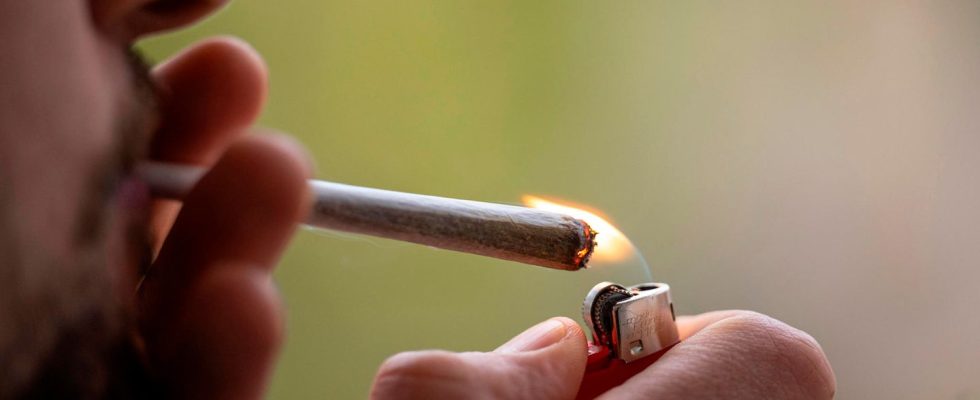Traffic light plans
Agreement on legal text: Cannabis legalization should come as early as April 1st
A man lights a joint. The cannabis legalization sought by the traffic light coalition is viewed critically by the majority of Germans surveyed
© Hannes P. Albert / DPA
After long negotiations and postponements, things are now becoming concrete when it comes to cannabis legalization. The traffic light coalition has agreed on the final details of its law.
Since taking office, cannabis advocates have repeatedly peppered the traffic lights with a question in the scene’s jargon: “When will Bubatz be legal?” – So when will cannabis legalization come? Now there is the answer: Home cultivation and possession of certain amounts of the drug should be permitted for adults from April 1st next year. Cannabis clubs for collective cultivation should then be possible on July 1st.
The traffic light parties have agreed on these and other details, as can be seen from a paper with corresponding proposed changes to the cannabis law, which has been under negotiation for months and was available to the German Press Agency.
“During the negotiations, we agreed on a paradigm shift in cannabis drug policy and thereby expressly recognize social reality,” said the health policy spokesmen for the SPD, Greens and FDP factions – Heike Baehrens, Janosch Dahmen and Andrew Ullmann – on Monday in Berlin.
Plans for cannabis legalization are becoming more concrete
Legalization is a project from the traffic light coalition agreement. The draft law has been discussed for some time. As a first step, cannabis should be removed from the list of prohibited substances in the Narcotics Act. Adults aged 18 and over should be allowed to own a certain amount. A maximum of three plants are allowed to be grown at home. In so-called cannabis clubs, club members should be allowed to grow together and give the flowers to each other. The law still has to be passed in the Bundestag.
The original plan to offer cannabis for sale in licensed shops will not initially be implemented. The slimmed-down legalization was originally supposed to come into force at the turn of the year. Health Minister Karl Lauterbach (SPD) recently confirmed that this can no longer be achieved.
The traffic light parties have now specifically agreed on less strict rules for the possession and consumption of cannabis than originally planned. The Greens and FDP had put pressure on this. For home cultivation, the permitted amount of dried cannabis is doubled from 25 to 50 grams. The taboo zone for cannabis consumption around daycare centers, playgrounds or schools will be reduced from 200 to 100 meters.
The proposed criminal provisions will also be relaxed so that if the ownership limits are slightly exceeded, there is no immediate risk of criminal liability, as Green health politician Kirsten Kappert-Gonther put it on Monday. Originally, possession of more than 25 grams was supposed to be considered a criminal offense. Amounts of between 25 and 30 grams of cannabis in public areas and between 50 and 60 grams of cannabis in private areas should now be considered an administrative offense. Only then does possession become a criminal offense and could theoretically be punished with prison.
Dealing with cannabis remains prohibited, the traffic light partners said. In particular, the supply of cannabis to children and young people is rigorously prosecuted and punished.
Cannabis legalization
This is not how the cabinet smokes weed
The issue of cannabis and driving should be resolved by March
The question of cannabis and driving is still being clarified. The Federal Ministry of Transport is expected to propose a THC limit by the end of March. THC is the active ingredient in the cannabis plant that is primarily responsible for the intoxicating effect. The current absolute ban on driving under the influence of cannabis should be replaced by a regulation that – like the 0.5 per mille alcohol limit – set a limit for THC in the blood, it was said.
Opponents of legalization once again criticized sharply: “While Germany is in a national crisis, the traffic lights are taking care of smoking weed,” said CSU General Secretary Martin Huber. “Cannabis consumption among young people will increase because such substances are always being passed on to younger people,” warned the President of the Professional Association of Pediatricians and Adolescents, Thomas Fischbach, in “Welt”.

